进程的概念
引入
我们先不谈进程是什么东西?我么先用一个现实中的例子过渡到进程的概念!
假设你是一个大学的校长,在你的学校中有几万名学生!你应该如何才能管理好你的学生呢?在 C 语言的学习过程中我们都写过学生信息管理系统,可以从中借鉴管理的思路!
在学生信息管理系统中,每一名大学生都有自己的学号,姓名,性别,年龄等等属性,管理一个大学的学生,就是将每一个学生的基本信息组织起来,使用结构体封装起来!然后放到一个数据结构中,比如链表!之后呢我们想管理学生就只需要对这个链表进行增删改查啦!
- 假设你的学校新增了一名学生,首先你要做的就是将他的基本信息收集起来,然后插入到这个链表中来!
- 假设你要开除一名学生,你只需要将他的信息从链表中删除,再通知这个学生就行了!
- 假设你要为成绩第一的同学颁发奖学金,那么你就将链表中的学生信息按照总成绩排序,拿到成绩第一的学生的信息,然后通知他!
这个现实生活中的例子和 C 语言的学生信息管理系统思路都有一个共同点:那就是先描述被管理对象的信息,然后通过一定的形式将对象组织起来,统一管理。
这就是一个 先描述,再组织 的过程。
进程的概念
在学校的教材中,我们可能会看到这样的进程定义:一个已经加载到内存中的程序,叫做进程;或者正在运行的程序叫做进程。
我们先不看这些,我们按照刚刚讲过的思路来理解进程:在我们的电脑上是不是可以运行很多个程序,那么是不是就有很多个进程!既然有这么多的进程,那么操作系统要如何管理这些进程呢?
答案就是先描述再组织。
-
先描述:任何一个进程,在加载到内存的,形成真正的进程时,操作系统要创建描述进程的结构体对象。我们将这个结构体对象称为:进程控制块(PCB,process control block)。
这个描述进程的结构体对象是进程属性的集合,包含:- 进程编号。
- 进程状态。
- 进程的优先级。
等等。类比生活中的例子,操作系统对进程的管理本质上就是对描述进程的 PCB 做管理。
-
后组织:操作系统需要管理很多进程,在每个进程的结构体对象中,可以通过在 PCB 中添加
PCB*这样的指针信息,将许许多多的进程组织起来!
因此我们能得出一个结论,进程由两部分组成:
- 描述进程相关属性的的结构体对象,即 PCB。
- 该进程的代码和数据。
查看进程的相关属性
上面讲解的是所有操作系统的共同逻辑。也就是说在不同的操作系统中 PCB 有着不同的定义。在 linux 操作系统中,描述进程属性的结构体叫做:task_struct。
我们来简单看看 task_struct 中有哪些属性吧:
- 标示符: 描述本进程的唯一标示符,用来区别其他进程。
- 状态: 任务状态,退出代码,退出信号等。
- 优先级: 相对于其他进程的优先级。
- 程序计数器: 程序中即将被执行的下一条指令的地址。
- 内存指针: 包括程序代码和进程相关数据的指针,还有和其他进程共享的内存块的指针
- 上下文数据: 进程执行时处理器的寄存器中的数据[休学例子,要加图CPU,寄存器]。
- I/O状态信息: 包括显示的I/O请求,分配给进程的I/O设备和被进程使用的文件列表。
- 记账信息: 可能包括处理器时间总和,使用的时钟数总和,时间限制,记账号等。
当然,linux 内核源码中的 task_struct 肯定不止这么一点东西!有兴趣你可以下载 Linux 内核源码来看看:➡️linux 内核源码下载
如果你不想下载,在文章的最后,我也会附上 linux 2.6 版本的 task_struct。
那么我们应该如何使用命令查看一些进程的相关属性呢?
ps axj
-
ps axj:这个命令可以列出所有进程的部分属性。

横线的部分就是进程的属性名称啦!如果你要查看指定进程的部分属性,可以通过管道和
grep命令过滤一下。比如,我们写了这样的一个代码:
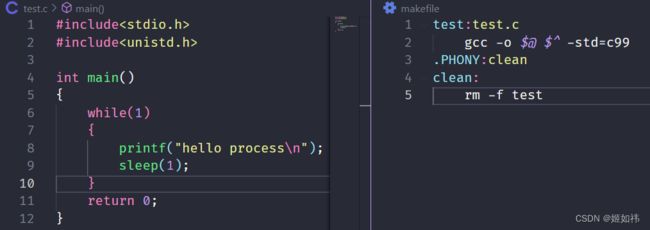
make生成可执行文件,./test运行之后,我们写的程序就变成了一个进程啦!
查看指定进程的相关属性:ps axj | head -1 && ps axj | grep testps axj显示所有进程,ps axj | head -1就是提取出来进程属性的名称。&&表示执行完前面的命令紧接着执行后面的命令。ps axj | grep test:过滤出来名为test的进程。
我们看到不仅有test进程,还有一个grep --color=auto test这是因为我们在使用grep命令过滤test的时候,grep进程也是携带了test这个过滤关键字的!自然就会被打印出来了!为什么 grep 也是进程呢?这个后面会讲的!
那如果我们看这个
grep不顺眼,不想看见他怎么办呢?很简单只需要加上-v选项反向匹配就行啦!ps axj | head -1 && ps axj | grep test | gerp -v grep我们也是看到了一些进程的属性:
- PPID:父进程的编号。
- PID:当前进程的编号
- STAT:进程的状态。
这些以后都会讲,现在知道怎么查看进程的属性就行了!
ps axj 命令的本质
在进程的属性中,有一个属性可以知道当前进程可执行文件的名称(等会儿就会提到)。在 linux 中 task_struct 是由双链表组织起来的。因此 ps axj 命令的本质就是遍历双链表,根据进程的可执行文件名称,找到这个进程的 task_struct 打印进程的部分属性信息!
proc 目录
-
除了上面的这种方法,还可以:
ls /proc。这个文件中有所有进程的信息,这个文件中有以进程的 PID 命名的目录,这个目录里面就是进程的相关属性信息啦!/proc目录是实时更新的,进程没了,就不会在这个目录中出现了。我们运行刚刚写的程序:
./test,然后查看这个进程的 PID:ps axj | head -1 && ps axj | grep test | gerp -v grep。

可以看到这个进程的PID是 725412。当然你的肯定和我不一样哈!然后我们进到这个目录看看看有木有一个叫做 725412 的目录!

查看这个目录的内容:cd 725412; ls -al这里的分好和刚才的&&是一个意思,表示执行完前一个命令,接着执行下一个。
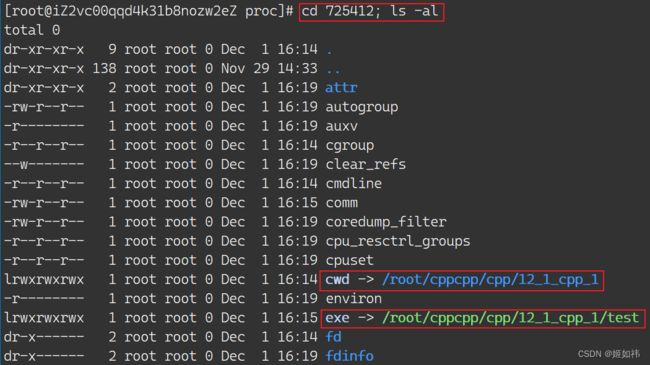
我们看到有很多进程的属性呢!这里我想简单提一下cwd和exe。-
cwd:可以看到他指向的是可执行文件的所在路径!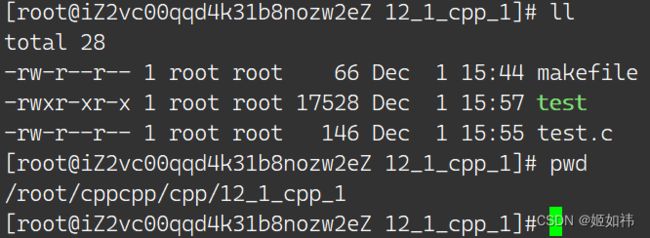
如果你想验证只需要将生成的可执行文件用mv命令移动到其他的位置就行啦!在这里我想提一下在 C 语言我们使用打开文件的函数
fopen,我们这样使用fopen的时候:fopen("./test.txt", "w");我们知道如果当前路径下不存在
test.txt就会自动创建,那他怎么知道当前路径是什么,就是因为进程中有cwd属性,能够找到当前路径。也就是说这个路径中的./会被替换为cwd/test.txt。 -
exe:这个简单,就是可执行文件嘛!
可以看到,当我们
ctrl + c结束掉进程的时候,我们在/proc目录下就找不到刚才存在的名为 725412 的目录了!
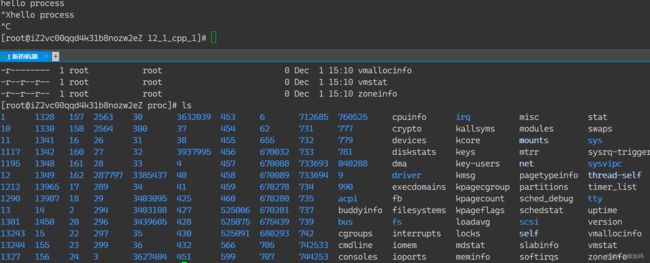
-
系统调用
还有一些系统调用也能获取进程的属性,这里我们就先学习两个:
getpid():获取调用该函数的进程的PID。getppid():获取调用该函数的进程的父进程的PID。也就是调用该函数的进程的PPID。
#include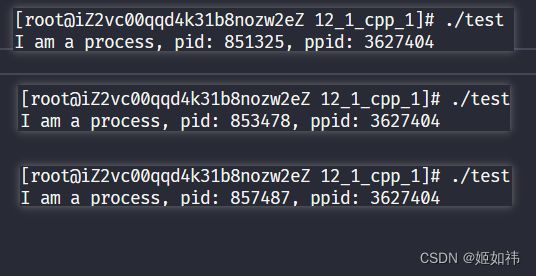
可以看到,我们顺利获取了我们写的进程的 pid, ppid,上图中,运行了三次。我们发现我们写的这个进程的 pid 一直在变化,ppid 却没有,这是为啥呢?
我们直接来看看 pid 为 3627404 的进程是啥?
ps axj | head -1 && ps axj

这不就是 bash 进程嘛!
我们看到还有两个命令形成的进程:ps axj,grep。这俩进程的 PPID 就是 bash 进程!这能说明所有的命令都是 bash 的子进程嘛?这里回答不了!等我们以后再讲。
我们重新登录 xshell,bash 进程的 pid 就会改变。因此我们登录 xshell 操作系统就会为我们创建命令行解释器(就是我们输命令,能够处理命令的那个进程)的进程,即 bash 进程。
top 命令
这个命令也能查看进程,就和 Windows 的任务管理器有点相似。
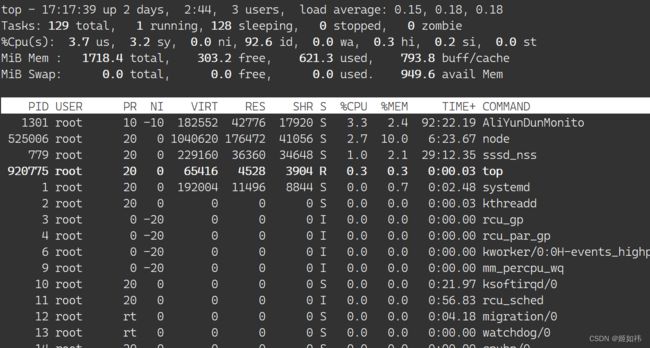
linux 内核 task_struct 一览
struct task_struct {
volatile long state; /* -1 unrunnable, 0 runnable, >0 stopped */
void *stack;
atomic_t usage;
unsigned int flags; /* per process flags, defined below */
unsigned int ptrace;
int lock_depth; /* BKL lock depth */
#ifdef CONFIG_SMP
#ifdef __ARCH_WANT_UNLOCKED_CTXSW
int oncpu;
#endif
#endif
int prio, static_prio, normal_prio;
unsigned int rt_priority;
const struct sched_class *sched_class;
struct sched_entity se;
struct sched_rt_entity rt;
#ifdef CONFIG_PREEMPT_NOTIFIERS
/* list of struct preempt_notifier: */
struct hlist_head preempt_notifiers;
#endif
/*
* fpu_counter contains the number of consecutive context switches
* that the FPU is used. If this is over a threshold, the lazy fpu
* saving becomes unlazy to save the trap. This is an unsigned char
* so that after 256 times the counter wraps and the behavior turns
* lazy again; this to deal with bursty apps that only use FPU for
* a short time
*/
unsigned char fpu_counter;
#ifdef CONFIG_BLK_DEV_IO_TRACE
unsigned int btrace_seq;
#endif
unsigned int policy;
cpumask_t cpus_allowed;
#ifdef CONFIG_TREE_PREEMPT_RCU
int rcu_read_lock_nesting;
char rcu_read_unlock_special;
struct rcu_node *rcu_blocked_node;
struct list_head rcu_node_entry;
#endif /* #ifdef CONFIG_TREE_PREEMPT_RCU */
#if defined(CONFIG_SCHEDSTATS) || defined(CONFIG_TASK_DELAY_ACCT)
struct sched_info sched_info;
#endif
struct list_head tasks;
struct plist_node pushable_tasks;
struct mm_struct *mm, *active_mm;
#if defined(SPLIT_RSS_COUNTING)
struct task_rss_stat rss_stat;
#endif
/* task state */
int exit_state;
int exit_code, exit_signal;
int pdeath_signal; /* The signal sent when the parent dies */
/* ??? */
unsigned int personality;
unsigned did_exec:1;
unsigned in_execve:1; /* Tell the LSMs that the process is doing an
* execve */
unsigned in_iowait:1;
/* Revert to default priority/policy when forking */
unsigned sched_reset_on_fork:1;
pid_t pid;
pid_t tgid;
#ifdef CONFIG_CC_STACKPROTECTOR
/* Canary value for the -fstack-protector gcc feature */
unsigned long stack_canary;
#endif
/*
* pointers to (original) parent process, youngest child, younger sibling,
* older sibling, respectively. (p->father can be replaced with
* p->real_parent->pid)
*/
struct task_struct *real_parent; /* real parent process */
struct task_struct *parent; /* recipient of SIGCHLD, wait4() reports */
/*
* children/sibling forms the list of my natural children
*/
struct list_head children; /* list of my children */
struct list_head sibling; /* linkage in my parent's children list */
struct task_struct *group_leader; /* threadgroup leader */
/*
* ptraced is the list of tasks this task is using ptrace on.
* This includes both natural children and PTRACE_ATTACH targets.
* p->ptrace_entry is p's link on the p->parent->ptraced list.
*/
struct list_head ptraced;
struct list_head ptrace_entry;
/* PID/PID hash table linkage. */
struct pid_link pids[PIDTYPE_MAX];
struct list_head thread_group;
struct completion *vfork_done; /* for vfork() */
int __user *set_child_tid; /* CLONE_CHILD_SETTID */
int __user *clear_child_tid; /* CLONE_CHILD_CLEARTID */
cputime_t utime, stime, utimescaled, stimescaled;
cputime_t gtime;
#ifndef CONFIG_VIRT_CPU_ACCOUNTING
cputime_t prev_utime, prev_stime;
#endif
unsigned long nvcsw, nivcsw; /* context switch counts */
struct timespec start_time; /* monotonic time */
struct timespec real_start_time; /* boot based time */
/* mm fault and swap info: this can arguably be seen as either mm-specific or thread-specific */
unsigned long min_flt, maj_flt;
struct task_cputime cputime_expires;
struct list_head cpu_timers[3];
/* process credentials */
const struct cred *real_cred; /* objective and real subjective task
* credentials (COW) */
const struct cred *cred; /* effective (overridable) subjective task
* credentials (COW) */
struct mutex cred_guard_mutex; /* guard against foreign influences on
* credential calculations
* (notably. ptrace) */
struct cred *replacement_session_keyring; /* for KEYCTL_SESSION_TO_PARENT */
char comm[TASK_COMM_LEN]; /* executable name excluding path
- access with [gs]et_task_comm (which lock
it with task_lock())
- initialized normally by setup_new_exec */
/* file system info */
int link_count, total_link_count;
#ifdef CONFIG_SYSVIPC
/* ipc stuff */
struct sysv_sem sysvsem;
#endif
#ifdef CONFIG_DETECT_HUNG_TASK
/* hung task detection */
unsigned long last_switch_count;
#endif
/* CPU-specific state of this task */
struct thread_struct thread;
/* filesystem information */
struct fs_struct *fs;
/* open file information */
struct files_struct *files;
/* namespaces */
struct nsproxy *nsproxy;
/* signal handlers */
struct signal_struct *signal;
struct sighand_struct *sighand;
sigset_t blocked, real_blocked;
sigset_t saved_sigmask; /* restored if set_restore_sigmask() was used */
struct sigpending pending;
unsigned long sas_ss_sp;
size_t sas_ss_size;
int (*notifier)(void *priv);
void *notifier_data;
sigset_t *notifier_mask;
struct audit_context *audit_context;
#ifdef CONFIG_AUDITSYSCALL
uid_t loginuid;
unsigned int sessionid;
#endif
seccomp_t seccomp;
/* Thread group tracking */
u32 parent_exec_id;
u32 self_exec_id;
/* Protection of (de-)allocation: mm, files, fs, tty, keyrings, mems_allowed,
* mempolicy */
spinlock_t alloc_lock;
#ifdef CONFIG_GENERIC_HARDIRQS
/* IRQ handler threads */
struct irqaction *irqaction;
#endif
/* Protection of the PI data structures: */
raw_spinlock_t pi_lock;
#ifdef CONFIG_RT_MUTEXES
/* PI waiters blocked on a rt_mutex held by this task */
struct plist_head pi_waiters;
/* Deadlock detection and priority inheritance handling */
struct rt_mutex_waiter *pi_blocked_on;
#endif
#ifdef CONFIG_DEBUG_MUTEXES
/* mutex deadlock detection */
struct mutex_waiter *blocked_on;
#endif
#ifdef CONFIG_TRACE_IRQFLAGS
unsigned int irq_events;
unsigned long hardirq_enable_ip;
unsigned long hardirq_disable_ip;
unsigned int hardirq_enable_event;
unsigned int hardirq_disable_event;
int hardirqs_enabled;
int hardirq_context;
unsigned long softirq_disable_ip;
unsigned long softirq_enable_ip;
unsigned int softirq_disable_event;
unsigned int softirq_enable_event;
int softirqs_enabled;
int softirq_context;
#endif
#ifdef CONFIG_LOCKDEP
# define MAX_LOCK_DEPTH 48UL
u64 curr_chain_key;
int lockdep_depth;
unsigned int lockdep_recursion;
struct held_lock held_locks[MAX_LOCK_DEPTH];
gfp_t lockdep_reclaim_gfp;
#endif
/* journalling filesystem info */
void *journal_info;
/* stacked block device info */
struct bio_list *bio_list;
/* VM state */
struct reclaim_state *reclaim_state;
struct backing_dev_info *backing_dev_info;
struct io_context *io_context;
unsigned long ptrace_message;
siginfo_t *last_siginfo; /* For ptrace use. */
struct task_io_accounting ioac;
#if defined(CONFIG_TASK_XACCT)
u64 acct_rss_mem1; /* accumulated rss usage */
u64 acct_vm_mem1; /* accumulated virtual memory usage */
cputime_t acct_timexpd; /* stime + utime since last update */
#endif
#ifdef CONFIG_CPUSETS
nodemask_t mems_allowed; /* Protected by alloc_lock */
int mems_allowed_change_disable;
int cpuset_mem_spread_rotor;
int cpuset_slab_spread_rotor;
#endif
#ifdef CONFIG_CGROUPS
/* Control Group info protected by css_set_lock */
struct css_set *cgroups;
/* cg_list protected by css_set_lock and tsk->alloc_lock */
struct list_head cg_list;
#endif
#ifdef CONFIG_FUTEX
struct robust_list_head __user *robust_list;
#ifdef CONFIG_COMPAT
struct compat_robust_list_head __user *compat_robust_list;
#endif
struct list_head pi_state_list;
struct futex_pi_state *pi_state_cache;
#endif
#ifdef CONFIG_PERF_EVENTS
struct perf_event_context *perf_event_ctxp;
struct mutex perf_event_mutex;
struct list_head perf_event_list;
#endif
#ifdef CONFIG_NUMA
struct mempolicy *mempolicy; /* Protected by alloc_lock */
short il_next;
#endif
atomic_t fs_excl; /* holding fs exclusive resources */
struct rcu_head rcu;
/*
* cache last used pipe for splice
*/
struct pipe_inode_info *splice_pipe;
#ifdef CONFIG_TASK_DELAY_ACCT
struct task_delay_info *delays;
#endif
#ifdef CONFIG_FAULT_INJECTION
int make_it_fail;
#endif
struct prop_local_single dirties;
#ifdef CONFIG_LATENCYTOP
int latency_record_count;
struct latency_record latency_record[LT_SAVECOUNT];
#endif
/*
* time slack values; these are used to round up poll() and
* select() etc timeout values. These are in nanoseconds.
*/
unsigned long timer_slack_ns;
unsigned long default_timer_slack_ns;
struct list_head *scm_work_list;
#ifdef CONFIG_FUNCTION_GRAPH_TRACER
/* Index of current stored address in ret_stack */
int curr_ret_stack;
/* Stack of return addresses for return function tracing */
struct ftrace_ret_stack *ret_stack;
/* time stamp for last schedule */
unsigned long long ftrace_timestamp;
/*
* Number of functions that haven't been traced
* because of depth overrun.
*/
atomic_t trace_overrun;
/* Pause for the tracing */
atomic_t tracing_graph_pause;
#endif
#ifdef CONFIG_TRACING
/* state flags for use by tracers */
unsigned long trace;
/* bitmask of trace recursion */
unsigned long trace_recursion;
#endif /* CONFIG_TRACING */
#ifdef CONFIG_CGROUP_MEM_RES_CTLR /* memcg uses this to do batch job */
struct memcg_batch_info {
int do_batch; /* incremented when batch uncharge started */
struct mem_cgroup *memcg; /* target memcg of uncharge */
unsigned long bytes; /* uncharged usage */
unsigned long memsw_bytes; /* uncharged mem+swap usage */
} memcg_batch;
#endif
};
总结
- 管理 = 先描述,再组织
- 进程 = PCB + 数据 + 代码
- 查看进程属性
- ps axj
- /proc
- 系统调用
- getpid()
- getppid()
- top
